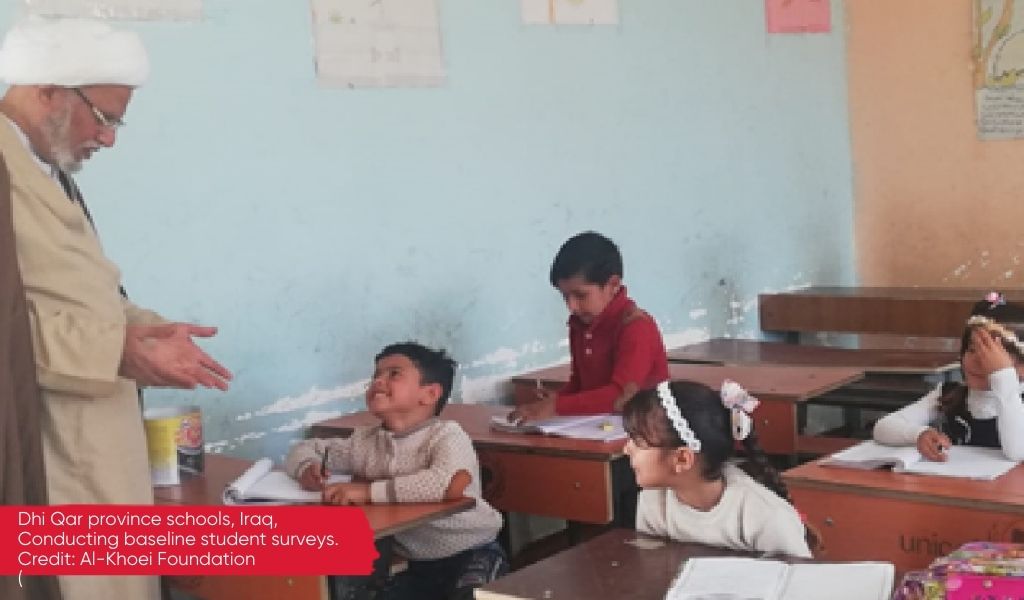The Al-Khoei Foundation, a founding member of the IDS-led Coalition for Religious Equality and Inclusive Development (CREID), has successfully engaged with religious leaders, teachers, headteachers and local education departments to initiate reforms to religious education in Iraq and address the problem of discrimination against religious minorities. Al-Khoei’s unique approach was to start at the grassroots level. The team are working with local stakeholders to see the curriculum reform rolled out nationwide.

Dhi Qar province schools, Iraq. Conducting baseline student surveys for the IDS-led CREID programme. Credit: Al Khoei Foundation
Islamic education policy in Iraq can be both exclusionary and contribute to lack of awareness towards religious minorities. Islam is the only religion that is taught as part of the Iraqi national curriculum. While non-Muslims are not required to attend Islamic classes, there are no alternative classes offered to non-Muslims which focus on other religions.
This system has led to discrimination and prejudice against religious minorities who are excluded from classes. The religious education curriculum in schools is not only mono-religious, but also often contains elements that outright disparage non-Muslim communities.
To address this problem, Al-Khoei Foundation, a member of the IDS-led Coalition for Religious Equality and Inclusive Development (CREID), has developed a reformed religious education curriculum with a coalition of religiously diverse stakeholders, aimed at improving awareness about religious diversity as well as responding to religious inequalities.
The new curriculum aims to improve the knowledge, attitudes and practices of students towards religious minorities, as well as building the pedagogical capacities of teachers for the promotion of freedom of religion or belief (FoRB). The promotion of FoRB values will help build long-term cohesive communities that are resilient to hate speech, discrimination and extremism.
Why this is important
Since religious education in Iraq is only taught from an Islamic perspective, diversity is also understood from an Islamocentric approach. During focus groups held by Al-Khoei Foundation, Islamic education teachers only agreed with concepts of religious diversity when the ‘other’ religions were mentioned in the Holy Quran. Knowledge about religious minorities, such as Yazidis, Mandaeans and Kakais, was not deemed important and in some accounts described as ‘not beneficial for students’.
However, stakeholders, including local education department officials, recognised that this thinking needed to change in teachers before students. One official in Anbar province, a region formally occupied by ISIS, expressed that this lack of awareness has contributed to these minorities enduring much violence over the years, most recently by the terrorist organisation ISIS.
Impact
With the support of CREID, Al-Khoei Foundation has sought to understand religious education through an assessment of the experiences and local knowledge of key stakeholders. Local education departments, headteachers and teachers from different schools were added to online networks to discuss religious education as well as the needs of religious minorities.
Through engaging teachers in online focus group discussions that were observed by education authorities, Al-Khoei Foundation sought to create a space for a discussion around misconceptions held by teachers and raise awareness about the societal impact of curricula that misrepresents religious minorities.
After being exposed to the thinking of teachers, local education officials recognised the need to address this discriminatory attitude towards specific minorities. They acknowledged that when teachers are trained and their capacities enhanced in teaching FoRB, impact will be much greater, not just on students but also the local community as a whole.
Following this engagement, local authorities recognised the necessity of change in the attitudes of teachers and their buy-in to implement this in primary schools was secured. Those same networks were then used to plan teacher training and for the implementation of the reformed religious curriculum. In addition, these networks have raised awareness about the needs and rights of religious minorities.
To ensure that teachers are empowered and supported throughout this learning experience, a coalition of key stakeholders was established. They include religious leaders, education experts, education officials, headteachers and parents. The uniqueness of this approach is that change is happening on a grassroots level. Education reform in Iraq has mostly been introduced at the ministerial level and then implemented without an in-depth understanding of the needs on the ground.
In the future, the impact and value of these groups and coalitions needs to be made clear to decision makers at the ministerial level, to ensure that it can be replicated for a roll out of the new curriculum in other schools nationwide.
